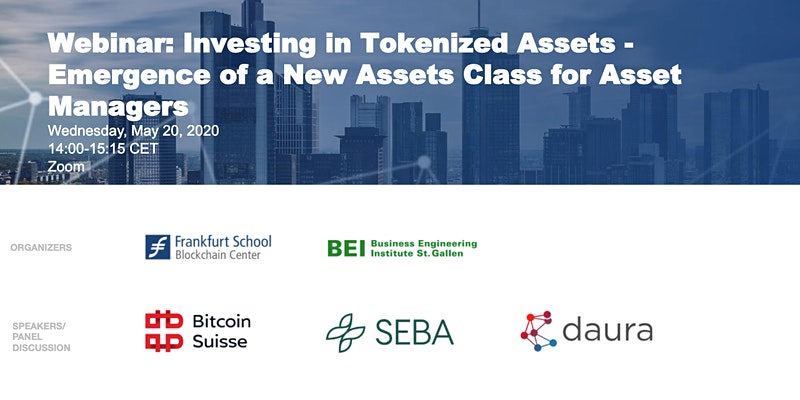
The State of Open Banking in Switzerland
The second Open Banking Summit in Switzerland took place at the end of August – a good opportunity to take another look at what is currently happening in the Swiss open banking scene.
Continue reading »Everything about networks and networkmodels, Aswell as companies who use these networks.

The second Open Banking Summit in Switzerland took place at the end of August – a good opportunity to take another look at what is currently happening in the Swiss open banking scene.
Continue reading »
61 % of Germans would obtain financial services from an online retailer. In contrast, 65% of German banks do not see their customer interface threatened. The situation is similar when it comes to the question of whether banks see themselves threatened by disruption from digital competitors, with 68% answering in the negative. In view of these contradictory figures, the question arises as to whether German banks are in the process of missing out on one of the most disruptive trends in banking: Embedded Finance.
Continue reading »
The concept of business ecosystems has become established in the context of corporate operations in recent years. Business ecosystems seem to provide a particularly advantageous foundation in times of uncertainty and diverse customer needs. Often, companies that orchestrate value creation among the different actors are considered to play a prominent role when it comes to enabling business ecosystems. The question, however, is what factors are necessary for an orchestrator to be able to build a business ecosystem business model. In the following, I provide insight into the results my master’s thesis, which identifies such factors from an orchestrator’s perspective.
Continue reading »
How do you decide whether you want to participate in an ecosystem? And if so, in which position? This article offers a first clue.
Continue reading »
This article shows, by way of example in the area of housing, how various services can be meaningfully combined in an ecosystem in order to comprehensively address a customer need.
Continue reading »
Insurtechs are constantly making news in the financial world. Whether they are seen as the big competitor to insurers, exploiting the limping digitalization of the big players, or helping conventional insurers to arrive in the 21st century, startups are bringing a breath of fresh air to the industry through new technologies such as artificial intelligence (AI) or natural language processing (NLP). Due to the abundance of new services and business models, it is appealing from both an entrepreneurial and scientific perspective to gain an overview of the structure and innovative capacity of the market.
Continue reading »
Despite many known advantages, it is still difficult, especially for practitioners, to identify concrete application areas for blockchain-based applications. This article takes this as its starting point and presents a sector-independent typology of application fields, which not only serves to analyze existing blockchain applications, but also provides users with an orientation as to which general possible uses there are for the blockchain and how complex an initial implementation of the respective applications can turn out to be.
Continue reading »
For small and medium-sized enterprises (SMEs), AI offers enormous potential for scaling and increasing efficiency, but for these companies in particular there is no alternative to using GAFA services because they themselves lack, for example, machine learning knowledge or the necessary data to train algorithms. An analytics marketplace could solve these challenges.
Continue reading »
37 billion US dollars. With this issue volume, Ant Group, formerly Ant Financial, a Chinese tech group created by Alibaba founder Jack Ma, was to be traded on the Shanghai and Hong Kong stock exchanges. Many see new value creation logics, so-called business ecosystems, which Ant Group is said to have developed for itself, as being behind the rapid growth and the extremely high company valuation. However, the assumption that Ant Group is an ecosystem should be treated with caution. In the following, we have analyzed individual platforms in more detail based on the work of the CC Ecosystem.
Continue reading »
The trend towards value creation in ecosystems has led to a multitude of ecosystem definitions in the past. This makes it difficult even for the interested reader to understand the research results presented. To what extent do the ecosystem concepts really differ and can the findings of one field be transferred to the other?
Continue reading »
What distinguishes an ecosystem from other forms of cooperation? There are already various other concepts that describe cooperations or network structures, but they do not represent ecosystems at all. This article deals with forms of cooperation and their differentiation from ecosystems and presents 8 criteria for the identification of ecosystems.
Continue reading »
Digitalization is necessary, but its costs are often not offset by corresponding additional revenues. Ecosystems can provide a solution.
Continue reading »
According to a survey, 90% of bankers are convinced that open banking can increase the organic growth of banks by 10%[1]. A global banking survey also found that 86% of banks plan to use open APIs in the next 12 months to enable open banking capabilities[2]. To address this development and better understand the opportunities and implications of the trend towards opening up a banks’ own IT infrastructure, the Business Engineering Institute and Commerzbank have jointly authored an open banking white paper on the future of corporate banking collaboration. In this white paper, we explored the overarching questions of what the open banking concept is all about and how it will change value creation, particularly in corporate banking.
Continue reading »
Recently, the Swiss Bankers Association published an overview that outlines the status of open banking in Switzerland and formulates requirements for its further development of open banking. These requirements include the clear strategic positioning of Swiss banks and the joint development of standardized APIs for data exchange between financial institutions and third-party providers. The aim of this overview is to “support the dialogue in the financial center”, as Richard Hess writes in the initial contribution to the blog parade of the Swiss Bankers Association. The Open Banking Summit of the standardization initiative OpenBankingProject.ch pursued the same goal on September 10th, with various presentations focusing on these two requirements.
Continue reading »
The examples of Alibaba, Amazon and Airbnb impressively demonstrate the value creation potential of ecosystems compared to traditional, linear value creation structures. But how do you plan and develop an ecosystem? As I explained in the first part of this blog post, traditional strategy concepts cannot be easily transferred to ecosystems. So what constitutes an ecosystem strategy? In the following, I will present three further prerequisites for the successful design of an ecosystem, which must be part of every discussion about building or participating in any ecosystem.
Continue reading »
The term ecosystem strategy is very present in science and practice and numerous strategic recommendations for action, for example for taking on certain roles, can already be identified. However, a uniform understanding of the term or an overarching approach to building up or positioning oneself in ecosystems does not yet exist. In this blog post I try to approach the topic by identifying four prerequisites for the success of an ecosystem and by investigating the extent to which an ecosystem strategy differs from a classical corporate strategy.
Continue reading »
Since the beginning of 2020, the coronavirus pandemic has caused an enormous slump in the global economy due to lockdowns all over the world. The IMF expects global GDP to decline by 5%, and for the euro zone it is likely to be as much as 10.2% [1] – and these are the figures before a possible second wave. It remains to be seen how the economy will recover. What can already be well assessed, on the other hand, are the qualitative effects of the pandemic on the macro trends relevant to the financial industry.
Continue reading »
In order to position itself in the FinTech market with an AI-based application, a company needs a deep understanding of the AI FinTech market, i.e. both the existing applications and the business models that have developed around these applications. In the first part of this blog post, we used the AI Application Taxonomy, a tool to describe the properties of an AI application in more detail, to analyze a total of 79 AI applications from 75 FinTechs and to identify four overarching application archetypes. In the second part, we now focus on the business models within which these applications are used and the resulting positioning options for financial institutions.
Continue reading »
The Business Engineering Institute St. Gallen and the Frankfurt School Blockchain Center cordially invite you to a virtual panel discussion on May 20th where landmark companies in the blockchain space discuss the outlook for crypto assets as an alternative asset class as well as forthcoming market developments.
Continue reading »
In an interview with “Konfuzius-Institut” – the Magazine, Daniel Fasnacht explains how the importance of money is beginning to change, how digital payment systems work in China and what role China could play in financial services and trade worldwide.
Continue reading »
APIs represent an important component of the digital transformation towards networked business models. This inevitably raises questions: Do I start by providing an API developer portal or an overall strategy? Which infrastructure components should be used and to what extent should I provide central guidelines? How can I prioritize possible activities? The “API House of Digital Business” provides assistance in answering these questions.
Continue reading »
The financial sector is currently facing one of its biggest challenges with the Corona pandemic: A collapse in economic growth, high unemployment, credit defaults and volatile stock markets. Furthermore, the old problems such as pressure on margins, increasingly intense competition, the shift of the customer interface towards innovative fintechs and the ubiquitous digitalization have not yet been solved. These developments challenge traditional business models of local banks, but also offer opportunities for those who are willing to change or reinvent themselves.
Continue reading »
In a few years’ time, new or further developed sensors in smartwatches will not only record the wearer’s movements, but also their heart rhythm and breathing as well as their stress levels via measuring their skin surface tension. Around the world, thousands of developers are working on the new possibilities, hundreds of investors are evaluating the economic potential, and millions of consumers are waiting for the new gadgets. Will intelligent machines such as smartwatches with such capabilities bring us one step closer to a happy society?
Continue reading »
Chinese tourists are big business in Europe. Their needs will give rise to disruptive business models with new digital payment services. Technology giants are about to build ecosystems that integrate QR code payment across Europe, threatening established and profitable banking businesses.
Continue reading »
Especially within the last years we have seen high attention on network structures, organizational forms that question the traditional linear value chain and promote cross-industry […]
Continue reading »